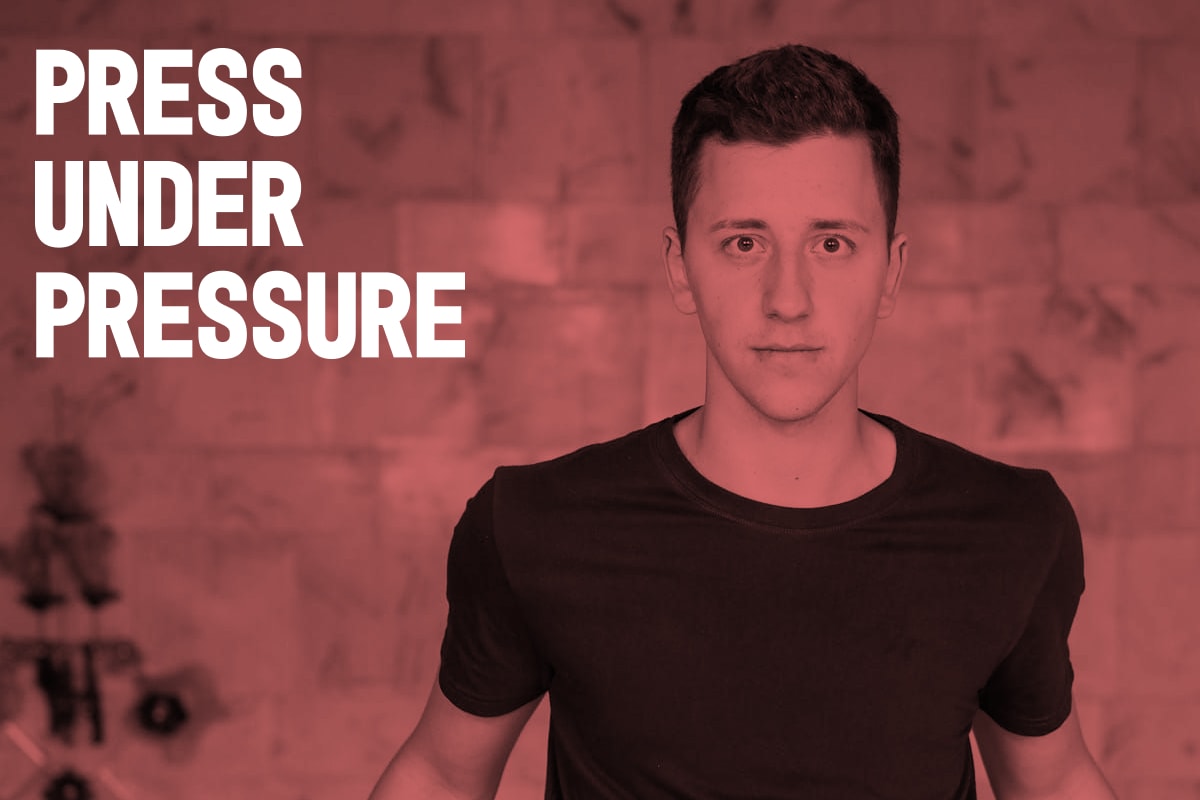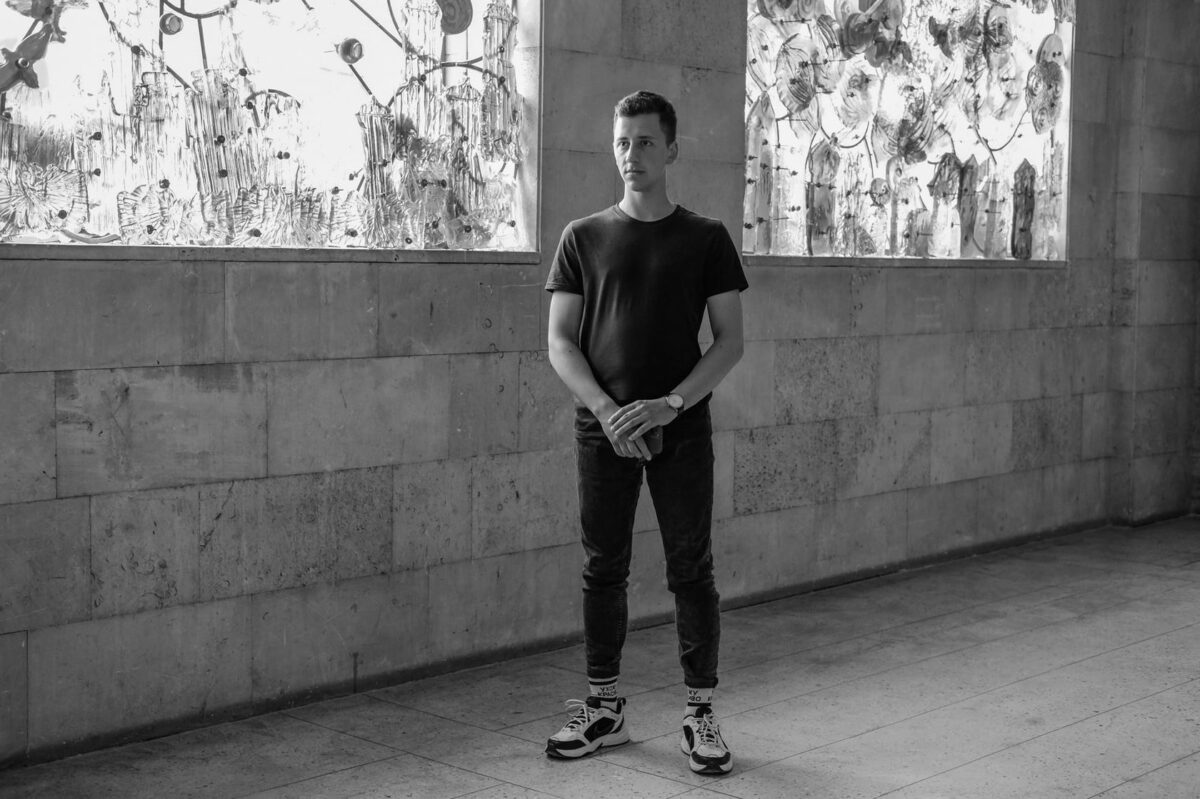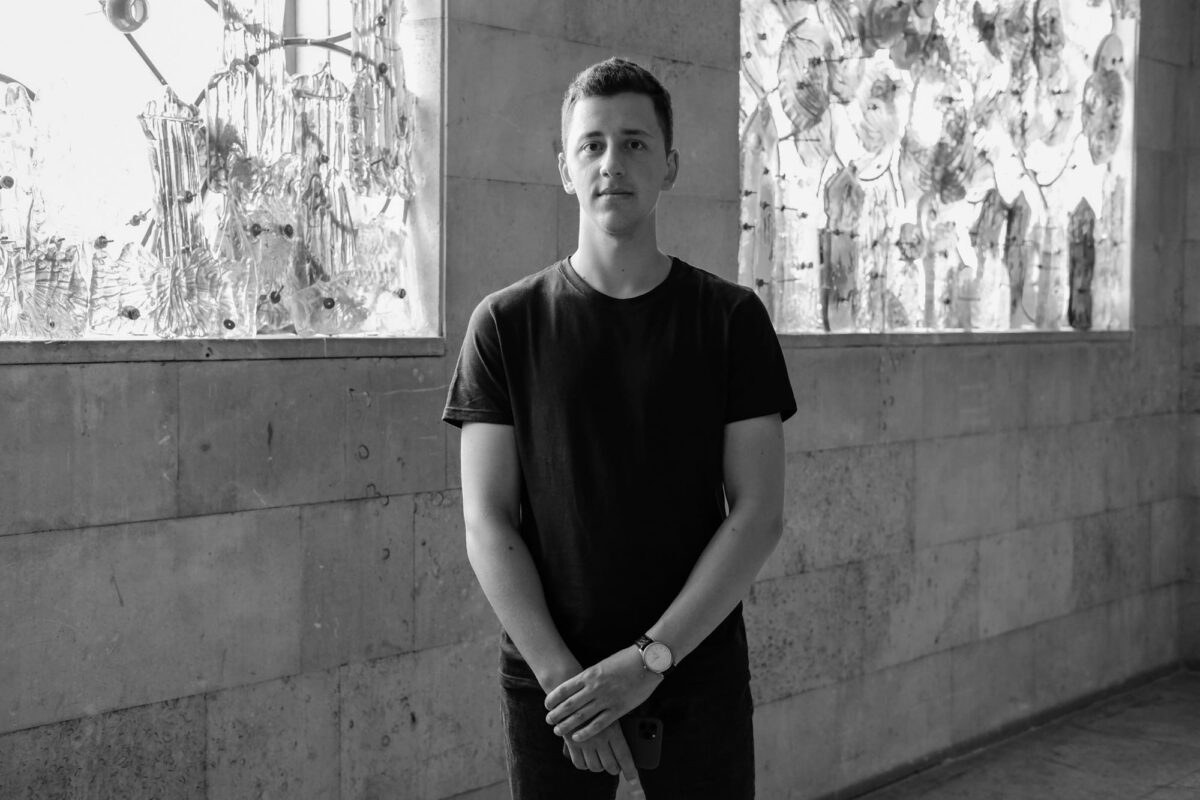
Alexey Khudanov was violently detained on the night of August 9-10, 2020. He was on an editorial assignment and a press card with him. But Alexey spent that night with his face flat on the floor of the gym of one of the police departments, before being taken to a prison in Zhodino. In the end, they released him – without trial and without a copy of the arrest protocol. Here is Alexey’s account of what he saw and what he experienced.
On August 9, I was working as a journalist near [opposition leader] Tikhanovskaya’s headquarters. I had my press card, and was on an editorial assignment. At about midday, I went home. My road passed through Nemiga, «Stella», and at the crossroads there were a lot of prison trucks and riot police. I asked if I could continue and got a polite answer: yes, you may; you won’t get in trouble. There were practically no protesters on the streets. I passed «Volodarka» street. There was a traffic police car at the intersection, and the traffic cop told me that I could pass through, but he advised me to take off the white ribbon from my wrist – so as not to draw the attention of the riot police. I took off the ribbon and held it in my hand. However, I only managed to proceed a few metres before suddenly a blue minivan drove up. For officers in full riot gear, looking like cosmonauts, leapt out.
They put me on the ground, shouted something rude, twisted my hands behind my back, put zip ties on my hands. One riot policeman saw the white ribbon in my hand, and shouted: «you’re screwed!» For some reason, he put the ribbon on my wrist again. Next, they slammed me into a yellow bus just like the ones running the streets as public transport. It was parked next to prison trucks.
Everyone on the bus was forced on their knees. First, they searched me. Nothing suspicious was found among my things, except a mask. It was a medical mask but decorated with traditional embroidery. «You’ll get done for this mask», said the guy who searched me. He must have been around 20 years old.
I presented my press card and proof of my editorial assignment, but the policemen just laughed and shoved me into the bus, already packed with people on their knees.
We were all in the same position – hands behind backs and faces down. Those who tried to raise their heads and look around were beaten. Some were beaten with fists, some with a truncheon. Once there were 30–40 people inside the bus, they started letting us out one by one.
A riot policeman said: «It’s your task now to stand up as quickly as possible».
We figured out pretty soon what this actually meant: it is very hard to stand up after spending 30 minutes on your knees. Your legs go numb. They beat us with their truncheons until we managed to get upright.
«You killed our comrade, our colleague, and now we’ll take our revenge!» the riot policemen said between the blows. I have no idea if it was true.
The sounds of blows, screaming, groaning, stenches – somebody had soiled themself – and a pretty female voice tinkling against this awful backdrop. It belonged to a uniformed girl discreetly discussing her private life with a colleague.
My turn to get out of the bus was getting closer and closer. Of course, it was scary. But I was not scared of being beaten. I was scared of being abused in some other way. I heard a lot about sexual abuse, about riot police guys urinating on detainees…
I was lucky to be able to stand up quickly. Also, the policeman who beat me on my back sort of made an unintended present to me: the baton caught the zip tie and my hands were freed.
We were transferred from the bus to a prison truck. It felt uncomfortable. Blood was all over the place, someone threw up nearby. But strange as it may seem, I felt safe for the first time when the door closed behind us: we were locked in the truck with no riot police inside.

Alexey Khudanov
They brought us to the gym at the district police directorate. There were people lying on their bellies with hands behind their backs along the entire perimeter. I got really terrified at that point. The setting looked like a scene from Beslan documentaries a lot, from the infamous school hostage taking terrorist attack. The children and parents were also held in a crowded gym.
I was made to lie down on the floor, too. I found an advantage in the situation: at least I was able to rest a little. I had got very tired during the day, so I was lying there trying to think about something neutral. The main thing was to make it to the moment when they would release me. What devastated me most, though, was there was no way to inform my family that I was relatively OK.
Then a man in uniform came up to me and asked me quietly: «Are you from Borovlyany? Do your parents know where you are? Give me your phone number». Afterwards Mom told me that someone really called and told her I had been detained. The weird thing is that the caller did not introduce himself as a police officer, but claimed he was my fellow detainee.
Time went by extremely slowly. No one had a watch. I recall two policemen taking selfies with us in the background. I also remember a girl pleading to let her take the pills she had in her bag, because she had a heart condition.
It truly hurt to watch healthy boys, obviously confident until recently, weep, mumble and whine. Someone was speaking in an unnaturally high-pitched voice. Witnessing a person’s breakdown is dreadful. They let us use the restroom at daybreak only. Not everyone was allowed, though. «I don’t like you» was reason enough to deny you a visit to the toilet.

Alexey Khudanov
At about 4 p.m. on the day following our detention, they started ordering people back into the prison trucks. Inside, the trucks had individual cubicles plus one large cage intended for five. I was put into one of the ‘individual’ ones – with two people already in it.
This marked the start of the worst hours of my whole life. The weather was not merely hot, it was sweltering. One could suffocate even outside, whereas two small egg-sized holes were the only air source in the cubicle. These openings were at the same height as my face, so I stuck my nose out, but felt no relief. We were not driving anywhere: just waiting for something. There was absolutely no air entering the cubicle. You longed only for one thing: to be able to breathe, for the slightest gasp of air. People in all tubes were begging for it. Someone passed out. When the truck finally started moving, it felt a bit better. Somehow, I was given a seat and even fell asleep. As I woke up, we had already arrived in Zhodino.
They allocated us a prison cell for 12 and, miraculously, it really did have 12 beds! That was so great! We had water and a place to sleep!
We drowned in sleep immediately. In the morning they brought us a lot of bread: eight loaves or so. We talked and talked all day long, mainly about the different ways we got detained. Newcomers arrived in the evening, half-naked, beaten and frightened. We gave them some bread, let them onto the beds right away and slept with our heads on the dinner table. These guys woke us up in the middle of the night saying: take the beds now, have some sleep! Awesome solidarity!
During the small hours, about 4 a.m., someone yelled: «Is Khudanov here? Take your stuff and come out!» I thought I would be taken to court, but it turned out they were releasing me. While looking for my stuff in the heap of other people’s things, I was devising a plan to get home from Zhodino at night.
However, it turned out people had come to pick us up! So many of them! Every person walking out was welcomed with applause as a hero. I was given coffee and food and driven home by car. Human kindness seemed very strange after all I had been through.
I thought the protest subsided while I was locked up, but I got incredible news: factories were striking, people were rallying every day, girls standing along the roads with flowers in their hands… Imprisonment would have been much easier had I known this.
For three days, I experienced a primal fear of going outside. Going to a store or walking along the road scared me. I had a feeling that a minivan would stop by and they would surely grab me. I feel better now, but I don’t participate in rallies yet. There are different ways to fight back. And I am fighting back.
Terms and conditions
Partial or full reprint is permitted subject to following terms of use.
An active direct hyperlink to the original publication is required. The link must be placed in the header of the reprinted material, in the lead or the first paragraph.
Reprints, whether in full or in part, must not make changes to the text, titles, or copyrighted photographs.
When reprinting materials from this page, attribution must be given to the Press Club Belarus “Press under Pressure” project, collecting evidence of repression against independent media and journalists in Belarus.